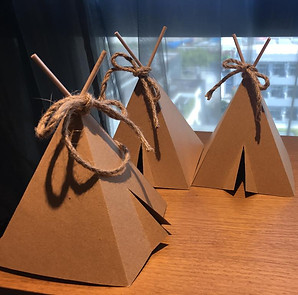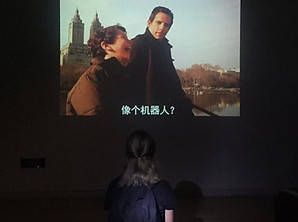Night at the Museum
Providing a special night for museum visitors

OVERVIEW
In 2018 summer, I interned in Shanghai Museum of Glass as a Service Designer. Our team redesigned our event Night at the Museum and hugely improved user satisfaction.
Night at the museum is one of the most important branding events in Shanghai Museum of Glass. As the doors close and the lights dim, it provides a memorable visiting and sleepover experience for visitors at this special night.
TEAM
Yuqing Chen
Jenny Yang
Eric Li
Hua Yang
Yuanching Xu
Effy Liu
MY ROLE
User Research
Service Design
Operation
DATE
Jul 2018 - Aug 2018
Challenge
We aimed to deliver a better visitor experience, improve the museum's brand image, and establish an actionable and flexible operation process for one of our most important activities " Museum Camp Night".

Visitor Experience Improvement
We had successful Museum Camp Nights in the past. However, due to many reasons, we collaborated with third-party agencies to hold this event, which might lead to a decrease in activity quality. We hope to create a wonderful and impressive experience for our users.

Branding
While we aimed to create a museum community, where families, youth, art lovers, artists, and anyone can enjoy the museum lifestyle here, we strive to deliver our value to the visitors. We hope our users view and perceive us as a creator of an art community and enjoy the community and lifestyle here with us.

Operation Process Establishment
To host Museum Camp Night independently, we needed an efficient operation procedure for the operation team to run this event repetitiously with or without the service design team and with limited creative resources.
Stakeholder Research
We conducted research to understand and analyzed all the stakeholders' perspectives related to overcoming our challenge, including our visitors, competitors, different teams in our museum.



Some pictures in our process
Visitor Research
To learn about our visitor's behaviors and thoughts, we joined our operation team during a Museum Camp Night, getting close to observe what is happening. Being a part of the activity allowed us to get a lot of first-hand experience and takeaways. Also, we talked to our visitors, experiencers to hear from their perspective through intercept interview and focus group.
Create user personas to understand who are our visitors





How do they fit into our value and business?

Visitor type we hope to attract most

Learning Enthusiast
Visitor type we currently own most

Care Taker
Visitor types we most likely to attract more in the current stage

Inspiration Seeker

Acclaimed Influencer
Competitor Analysis
We went to other popular museums in our city -- Shanghai to assess their different features to find out their weaknesses and strengths.

Understand Organization & Business
To overcome our current challenges, understanding our organization and business is a crucial part before we start reorganize our service and design.
We talked to internal stakeholders in Museum Camp Night to understand their perspectives and identify our strengths, weaknesses, opportunities, and threats based on our research findings.
Stakeholder map helps us define and understand different perspectives

We mapped stakeholders in the map according to the importance
Identify strengths, weaknesses, opportunities, and threats through SWOT Analysis

Service Design
Before we officially start to come up with new Museum Camp Night process, we proposed our service goal and principle with keeping our research findings in mind.
Service Goal

Eexperience Goal
1
Deliver unique experience for target visitors. Meet their needs for learning, exploring, and socializing.
Reduce the difficulty for internal operation team and requirement for staff, utilize human resource highly efficiently.

Operation Goal
2

3
Business Goal
Enhance our market influence, promote our brand, and enhance our competiveness.
Design Principle

Flexibility over the journey
While providing plentiful high-quality activities rely on our museum's existing resources, give users freedom and multiple choices to arrange their journey based on their interest.

Encouraging user-generated content
Encourage self-exploration, self-expression, and creating content by users themselves. Create an open environment for target users' needs.

Lessen operation burden
While working on delivering a better experience and creating impressive memory for visitors, always consider difficulty to hold events for operation team and keep it easy to run for internal staff.
Prototyping
We started planning for our new Museum Camp Night, aiming to attract our target users. We brainstormed and discussed with different stakeholders in our organization.

Brainstorming for a new Museum Camp Night

Thinking from different perspectives thought six thinking hats
Process Plan

Materials Design
Visitor brochure
We designed materials needed in the Museum Camp Night to provide an engaging experience and necessary guide needed during the night.
Users will get the introduction brochure at the beginning, with providing the background story settings, activity agenda, tickets for different galleries and museum camping map.

Page 1-2 shows activity agenda and background story

Page 3-4 include museum camping map and tickets, visual design by Hua
Treasure map for exploring museum at night
One choosable activity user can enjoy is exploring the museum at night when the doors close and the lights dim. They can appreciate collections and seek for hidden special glass souvenirs in exhibition halls with torches.

Treasure map with hall number and treasure areas, visual design by Yuanching
Other preparation for the night


Designed and assembled the handmade light lamb to decorate and light each camp at night.
Designed and created little paper campsites to mark and decorate banquet tables.




To achieve the best light effect at night for museum exploration, we tested different combinations of lighting and ensured our staff can adjust them proficiently at night.


For warming up before the banquet, we made cards for a warm-up activity.



We customized or purchased materials needed for a sleepover, museum exploration, art talk, night talk and other activities.



Consistent with our overall visual identity, we created a QR code scan for registered users to join in group channel and connect to each other.
We designed a postcard as a part of our souvenirs.
We were working on organizing and packaging our materials.
Moments at the Museum Camp Night

Check-In
We set up a check-in area and were waiting for users.

Glass Blowing
One user was working on glass blowing with our glass-making coach.

Art Talk
Users gathered in one gallery hall "BRKN" and talked with our guest artist about art.




Camping
Users camped in their favorite places to sleepover with elegant collections around.

Exploring at Night
A user was walking by an interactive wall when exploring at night.

Movie Watching
Watched Night at the Museum movie in the glass museum at night.

Night Talk
Host by our guest facilitator to talk about glass and art in candlelight.
Evaluation & Proposal
During the Museum Camp Night, we worked as designers and facilitators and got to learn the whole process design and operation. After the activity, we also collected users' feedback through our survey.
Visitor Behavior Analysis
We generated a new actionable operation plan for museum from our research, test, analysis and reflection.




How did they describe this night

What did they think is most impressive

Visitor Journey Analysis
We created a user journey map to visualize and evaluate their experience to detect our service flaws and whether we achieve our service goal or not.

Detailed analysis of user journey
We zoom in to analyzed user behavior, touchpoint, backend support and checked whether we achieve our service goal or not during the journey.








What did we learn from the analysis?


Service Proposal
With this activity's experience and lessons, we proposed an updated plan for the operation team to run Museum Camp Night repetitiously. We presented our prototyping evaluation and proposal to different departments in our organization, our curator gave us very positive feedback and approved our proposal.







Reflection
It was a challenging but very rewarding experience of working with different stakeholders and regenerating the complicate service design system. This experience helped me reshape my design philosophy, inspired me to think broader and maturer in the complex business context.
-
Understand the complexity of service design, always consider different stakeholders have different opinions due to their own perspective.
-
Collaboration across different departments requires effective communication and deep understanding. Learning how to achieve this is essential in design for an organization.
-
Always make sure that your design is actionable. Prepare plan B for a safe side; ensure everyone in the team knows how to conduct every step in the process; always communicate and plan in advance to avoid the delay caused by unexpected emergencies.
-
Challenge your assumptions with research, before you consider making changes. Find the right problem before solving it. Tackle the real problem, instead of just a symptom of something deeper.
